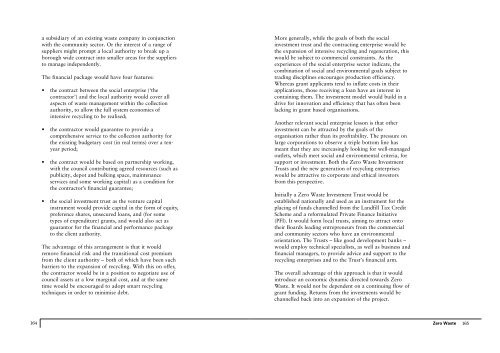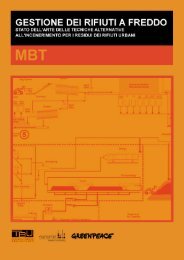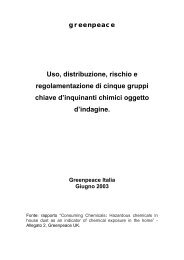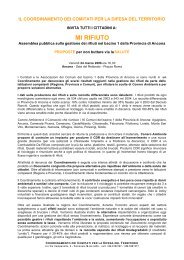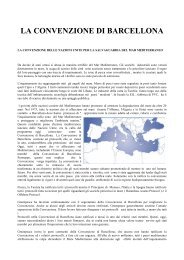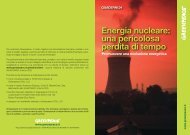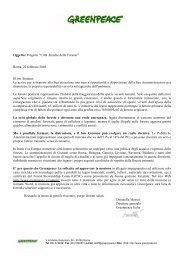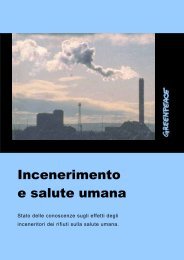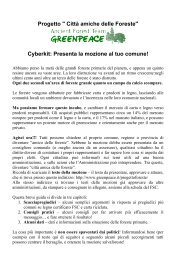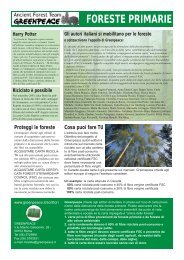Zero Waste by Robin Murray, Greenpeace Environmental Trust 2002
Zero Waste by Robin Murray, Greenpeace Environmental Trust 2002
Zero Waste by Robin Murray, Greenpeace Environmental Trust 2002
You also want an ePaper? Increase the reach of your titles
YUMPU automatically turns print PDFs into web optimized ePapers that Google loves.
a subsidiary of an existing waste company in conjunction<br />
with the community sector. Or the interest of a range of<br />
suppliers might prompt a local authority to break up a<br />
borough wide contract into smaller areas for the suppliers<br />
to manage independently.<br />
The financial package would have four features:<br />
• the contract between the social enterprise (‘the<br />
contractor’) and the local authority would cover all<br />
aspects of waste management within the collection<br />
authority, to allow the full system economies of<br />
intensive recycling to be realised;<br />
• the contractor would guarantee to provide a<br />
comprehensive service to the collection authority for<br />
the existing budgetary cost (in real terms) over a tenyear<br />
period;<br />
• the contract would be based on partnership working,<br />
with the council contributing agreed resources (such as<br />
publicity, depot and bulking space, maintenance<br />
services and some working capital) as a condition for<br />
the contractor’s financial guarantee;<br />
• the social investment trust as the venture capital<br />
instrument would provide capital in the form of equity,<br />
preference shares, unsecured loans, and (for some<br />
types of expenditure) grants, and would also act as<br />
guarantor for the financial and performance package<br />
to the client authority.<br />
The advantage of this arrangement is that it would<br />
remove financial risk and the transitional cost pre m i u m<br />
f rom the client authority – both of which have been such<br />
b a rriers to the expansion of recycling. With this on off e r,<br />
the contractor would be in a position to negotiate use of<br />
council assets at a low marginal cost, and at the same<br />
time would be encouraged to adopt smart re c y c l i n g<br />
techniques in order to minimise debt.<br />
More generally, while the goals of both the social<br />
investment trust and the contracting enterprise would be<br />
the expansion of intensive recycling and regeneration, this<br />
would be subject to commercial constraints. As the<br />
experiences of the social enterprise sector indicate, the<br />
combination of social and environmental goals subject to<br />
trading disciplines encourages production efficiency.<br />
Whereas grant applicants tend to inflate costs in their<br />
applications, those receiving a loan have an interest in<br />
containing them. The investment model would build in a<br />
drive for innovation and efficiency that has often been<br />
lacking in grant based organisations.<br />
Another relevant social enterprise lesson is that other<br />
investment can be attracted <strong>by</strong> the goals of the<br />
organisation rather than its profitability. The pressure on<br />
large corporations to observe a triple bottom line has<br />
meant that they are increasingly looking for well-managed<br />
outlets, which meet social and environmental criteria, for<br />
support or investment. Both the <strong>Zero</strong> <strong>Waste</strong> Investment<br />
<strong>Trust</strong>s and the new generation of recycling enterprises<br />
would be attractive to corporate and ethical investors<br />
from this perspective.<br />
Initially a <strong>Zero</strong> <strong>Waste</strong> Investment <strong>Trust</strong> would be<br />
established nationally and used as an instrument for the<br />
placing of funds channelled from the Landfill Tax Credit<br />
Scheme and a reformulated Private Finance Initiative<br />
(PFI). It would form local trusts, aiming to attract onto<br />
their Boards leading entrepreneurs from the commercial<br />
and community sectors who have an environmental<br />
orientation. The <strong>Trust</strong>s – like good development banks –<br />
would employ technical specialists, as well as business and<br />
financial managers, to provide advice and support to the<br />
recycling enterprises and to the <strong>Trust</strong>’s financial arm.<br />
The overall advantage of this approach is that it would<br />
introduce an economic dynamic directed towards <strong>Zero</strong><br />
<strong>Waste</strong>. It would not be dependent on a continuing flow of<br />
grant funding. Returns from the investments would be<br />
channelled back into an expansion of the project.<br />
164<br />
<strong>Zero</strong> <strong>Waste</strong><br />
165


